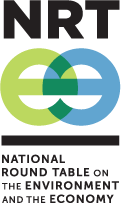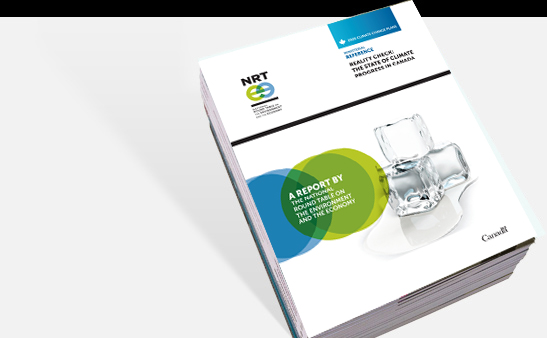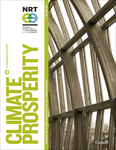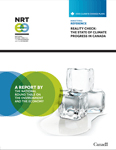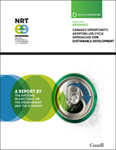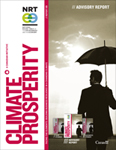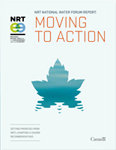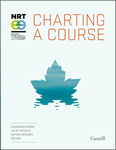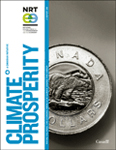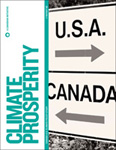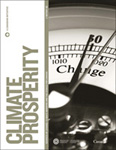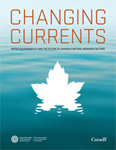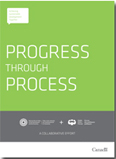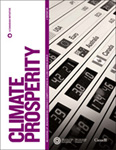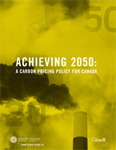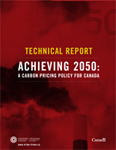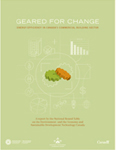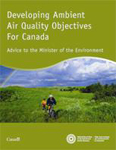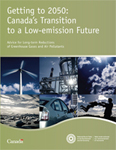Annual Report 2006-2007 – The Year in Review
Corporate Activities
Meetings
The members of the NRTEE meet as a round table four times per year to review and discuss the ongoing work of the agency, set priorities, and initiate new activities. Last year, the members met in Ottawa (Ontario) in May, August, and November 2006, and in February 2007.
An additional meeting was held on March 28, 2007. The purpose of this special plenary meeting was to focus on the content and delivery of the Clean Air Act program interim report to the Minister of the Environment.
The NRTEE’s Executive Committee held five meetings over the year in April, July, and October 2006, and in January and March 2007.
Program Areas
Drawing on the wealth of insight and experience represented by its diverse membership, the NRTEE examines the environmental and economic implications of priority issues, and offers independent advice on how best to address the challenges and seize the opportunities that emerge from them. Its activities are directly relevant to Canada’s national interest and to the government’s objective of building a globally competitive, sustainable, technologically innovative economy.
The NRTEE focused on several key areas during 2006–2007, including advice to the Government of Canada on long-term issues relating to energy and climate change. Program areas addressed by the NRTEE are described briefly below.
Energy and Climate Change
Goal: To provide advice on a long-term energy and climate change strategy for Canada.
NRTEE Advisory Note
In June 2006, the NRTEE released findings and advice to the government on a long-term climate change and energy strategy. The strategy was based on a scenario developed by the NRTEE that examined how, by 2050, to meet the energy needs of a growing economy, achieve substantial reductions in carbon emissions, and improve the air quality in Canada.
The NRTEE’s Advisory Note entitled, Advice on a Long-Term Strategy on Energy and Climate Change for Canada, focused on two questions:
- How can Canada protect and enhance its national interest with regard to energy and climate change issues between now and 2050?
- What do we need to do right now to meet this long-term objective?
The NRTEE examined whether existing or nearterm technologies are sufficient to reduce energyrelated greenhouse gas emissions by 60% by 2050 while still meeting the energy needs of sustained population growth, labour productivity, and per capita GDP. The study showed this reduction is possible only if Canada simultaneously increases energy efficiency and reduces the carbon intensity of energy production.
A copy of the NRTEE’s Advisory Note can be downloaded by visiting www.nrt-trn.ca.
Outreach Initiative
From November 6 to December 7, 2006, the NRTEE held ten day-long outreach sessions in nine Canadian cities. The purpose of the sessions was to present the findings of the NRTEE’s Advisory Note (released in June 2006) to knowledgeable stakeholders in different regions. Participants provided their views and opinions on the NRTEE’s overall approach to energy and climate change issues and to three strategic priorities that the NRTEE’s Advisory Note identified: energy efficiency, energy production (carbon capture and storage), and electricity generation.
In March 2007, the NRTEE delivered the synthesized results of its outreach sessions to the federal Minister of the Environment.
Canada’s International Role with Regard to Climate Change
Stemming from the Government of Canada’s request for advice on energy and climate change issues and the challenges that Canada faces, the NRTEE also examined Canada’s international role with regard to climate change.
The NRTEE concentrated on three areas:
- Integrating climate change objectives into Canadian foreign policy, trade, and aid objectives;
- Promoting linkages between Canada’s emerging carbon market and existing/emerging international ones, and encouraging ways to shape future global markets for carbon through domestic instruments and international initiatives; and
- Maximizing trade opportunities, in particular developing a strategy to promote the export of Canadian climate-related technologies.
This Advisory Note was released in October 2006.
Capital Markets and Sustainability
Goal: To explore the relationship between capital markets, financial performance, and sustainability in Canada.
In its Capital Markets and Sustainability program, the NRTEE explored the relationship between capital markets, financial performance, and sustainability in Canada.
By facilitating a strong, neutral, and independent multistakeholder debate on responsible investment1 and corporate responsibility,2 and exploring the links between sustainability (comprising environmental and social issues) and financial performance in Canada, the NRTEE addressed two key questions:
- Is there a financial return for business in pursuing the integration of environmental, social, and governance (ESG) factors?
- Is the pursuit of such policies rewarded through the investment allocation decisions of fund managers in the capital markets?
Over a two-year period, the NRTEE met with representatives from the private, public, and civil society sectors in a series of regional stakeholder meetings and consultations across Canada. The feedback and advice from these meetings and consultations, in addition to a series of commissioned background papers, helped broaden the NRTEE task force’s scope and understanding of existing barriers and opportunities available to promote and reward corporate competitiveness, innovation, and sustainability in the investment decision-making process in Canada.
A State of the Debate report incorporating the program’s findings and policy recommendations was released in February 2007.
1 The NRTEE defines responsible investment (RI) as the integration of environmental criteria and social criteria, insofar as the latter underpins the “social licence to operate” in investment decision making.
2 The NRTEE defines corporate responsibility (CR) as encompassing an examination of the same environmental and social issues as RI, but CR deals with the issues within the context of how capital is allocated within a company.
